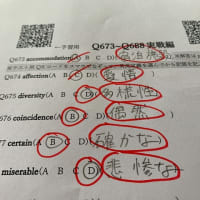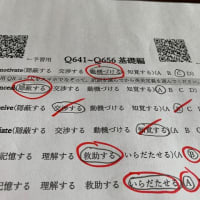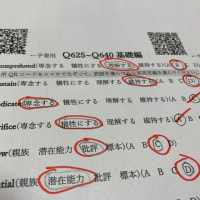苦労なしでは何も身につかないとはいえ、苦労すれば必ず酬われるわけではありません。実力不相応に難しい英文に頑張って取り組んでも得られるものは少ないです。
そんなわけで、多くの日本人英語学習者(おおむね英検準2級~準1級)に手頃と思われる、著作権の切れた童話「ドリトル先生航海記」に、シンプルで、大学入試にもTOEICにも英検にも有効な練習問題を組込んでみました。コロンで区切られているのが四語選択問題、スラッシュで区切られているのが四語整序問題です。*印は難易度の目安で、*印が多いほど難しい単語になっています。無印は語法・文法等の問題です。
※(86)の解答①(shallow)②(graceful)③(suspect)④(specimen)⑤(keep)⑥(direction)⑦(its head out of)⑧(exhausted)⑨(lower part of it )⑩(absorbed)⑪(found them crouching beside)⑬(seen him so thrilled)⑭(see if you can)⑮(him to be in)⑯(whisper)⑰(without)⑱(might have left before)⑳(got her errand done)
(87)
"What I want to know," the Doctor was saying, "is how the snail comes to be here. I was given to understand that he usually stayed in the Deep Hole; and ①(when / did / that / he) come to the surface it was always in mid-ocean."
"Oh, didn't you know?—Haven't you heard?" the porpoises replied: "you covered up the Deep Hole when you ②*(seized : reduced : sank : glanced) the island. Why yes: you let it down right on top of the mouth of the Hole—sort of put the lid on, as it were. The fishes that were in it at the time have been ③(get / to / out / trying) ever since. The Great Snail had the worst luck of all: the island nipped him by the tail just as he was leaving the Hole for a quiet evening ④**(stroll : domain : solitude : retrospect). And he was held there for six months ⑤(himself / trying / wriggle / to) free. Finally he had to heave the whole island up at one end to ⑥(tail / get / loose / his). Didn't you feel a sort of an ⑨**(apparatus : earthquake : interaction : applause) shock about an hour ago?"
"Yes I did," said the Doctor, "it shook down part of the theatre I was building."
"Well, that was the snail heaving up the island to get out of the Hole," they said. "All the other ⑩(saw / fishes / chance / their) and escaped when he raised the lid. It was lucky for them he's so big and strong. But the ⑪**(despair : strain : tribute : morale) of that terrific heave told on him: he sprained a muscle in his tail and it started ⑫**(disrupting : swelling : soothing : quivering) rather badly. He wanted some quiet place to rest up; and seeing this soft beach handy he crawled in here."
"Dear me!" said the Doctor. "I'm terribly sorry. I suppose I should have given some ⑬(of / that / sort / notice) the island was going to be let down. But, to tell the truth, we didn't know it ourselves; it happened by a kind of an accident. Do you imagine the poor ⑭**(particle : fellow : perspective : volcano) is hurt very badly?"
"We're not sure," said the porpoises; "because none of us can speak his language. But we swam right ⑮(our / him / around / on) way in here, and he did not seem to be really seriously injured."
"Can't any of your people speak shellfish?" the Doctor asked.
"Not a word," said they. "It's a most frightfully difficult language."
"Do you think that you might be able to find me some kind of a fish that could?"
"We don't know," said the porpoises. "We might try."
"I should be extremely ⑯**(compatible : grateful : exotic : slender) to you if you would," said the Doctor. "There are many important questions I want to ask this snail—And besides, I would like to do my best to cure his tail for him. It's the least I can do. After all, it was my ⑰*(orign : bill : reward : fault), indirectly, that he got hurt."
"Well, if you wait here," said the porpoises, "we'll see what can be done."
THE FIFTH CHAPTER. THE SHELLFISH RIDDLE SOLVED AT LAST
SO Doctor Dolittle with a crown on his head sat down upon the shore like King Knut, and waited. And for a whole hour the porpoises kept going and coming, ⑱(different / bringing / kinds / up) of sea-beasts from the deep to see if they could help him.
Many and curious were the creatures they produced. It would seem however that there were very few things that spoke shellfish ⑲(without : except : behind : over) the shellfish themselves. Still, the porpoises grew a little more hopeful when they discovered a very old sea-urchin (a funny, ball-like, little fellow with long whiskers all over him) who said he could not speak pure shellfish, but he used to understand starfish—enough to get along—when he was young. This was coming nearer, even if it wasn't anything ⑳(go / about / to / crazy). Leaving the urchin with us, the porpoises went off once more to hunt up a starfish.
解答は次回発表。ご意見、ご要望等はsuzuyasu@wmail.plala.or.jpでも承っております。
そんなわけで、多くの日本人英語学習者(おおむね英検準2級~準1級)に手頃と思われる、著作権の切れた童話「ドリトル先生航海記」に、シンプルで、大学入試にもTOEICにも英検にも有効な練習問題を組込んでみました。コロンで区切られているのが四語選択問題、スラッシュで区切られているのが四語整序問題です。*印は難易度の目安で、*印が多いほど難しい単語になっています。無印は語法・文法等の問題です。
※(86)の解答①(shallow)②(graceful)③(suspect)④(specimen)⑤(keep)⑥(direction)⑦(its head out of)⑧(exhausted)⑨(lower part of it )⑩(absorbed)⑪(found them crouching beside)⑬(seen him so thrilled)⑭(see if you can)⑮(him to be in)⑯(whisper)⑰(without)⑱(might have left before)⑳(got her errand done)
(87)
"What I want to know," the Doctor was saying, "is how the snail comes to be here. I was given to understand that he usually stayed in the Deep Hole; and ①(when / did / that / he) come to the surface it was always in mid-ocean."
"Oh, didn't you know?—Haven't you heard?" the porpoises replied: "you covered up the Deep Hole when you ②*(seized : reduced : sank : glanced) the island. Why yes: you let it down right on top of the mouth of the Hole—sort of put the lid on, as it were. The fishes that were in it at the time have been ③(get / to / out / trying) ever since. The Great Snail had the worst luck of all: the island nipped him by the tail just as he was leaving the Hole for a quiet evening ④**(stroll : domain : solitude : retrospect). And he was held there for six months ⑤(himself / trying / wriggle / to) free. Finally he had to heave the whole island up at one end to ⑥(tail / get / loose / his). Didn't you feel a sort of an ⑨**(apparatus : earthquake : interaction : applause) shock about an hour ago?"
"Yes I did," said the Doctor, "it shook down part of the theatre I was building."
"Well, that was the snail heaving up the island to get out of the Hole," they said. "All the other ⑩(saw / fishes / chance / their) and escaped when he raised the lid. It was lucky for them he's so big and strong. But the ⑪**(despair : strain : tribute : morale) of that terrific heave told on him: he sprained a muscle in his tail and it started ⑫**(disrupting : swelling : soothing : quivering) rather badly. He wanted some quiet place to rest up; and seeing this soft beach handy he crawled in here."
"Dear me!" said the Doctor. "I'm terribly sorry. I suppose I should have given some ⑬(of / that / sort / notice) the island was going to be let down. But, to tell the truth, we didn't know it ourselves; it happened by a kind of an accident. Do you imagine the poor ⑭**(particle : fellow : perspective : volcano) is hurt very badly?"
"We're not sure," said the porpoises; "because none of us can speak his language. But we swam right ⑮(our / him / around / on) way in here, and he did not seem to be really seriously injured."
"Can't any of your people speak shellfish?" the Doctor asked.
"Not a word," said they. "It's a most frightfully difficult language."
"Do you think that you might be able to find me some kind of a fish that could?"
"We don't know," said the porpoises. "We might try."
"I should be extremely ⑯**(compatible : grateful : exotic : slender) to you if you would," said the Doctor. "There are many important questions I want to ask this snail—And besides, I would like to do my best to cure his tail for him. It's the least I can do. After all, it was my ⑰*(orign : bill : reward : fault), indirectly, that he got hurt."
"Well, if you wait here," said the porpoises, "we'll see what can be done."
THE FIFTH CHAPTER. THE SHELLFISH RIDDLE SOLVED AT LAST
SO Doctor Dolittle with a crown on his head sat down upon the shore like King Knut, and waited. And for a whole hour the porpoises kept going and coming, ⑱(different / bringing / kinds / up) of sea-beasts from the deep to see if they could help him.
Many and curious were the creatures they produced. It would seem however that there were very few things that spoke shellfish ⑲(without : except : behind : over) the shellfish themselves. Still, the porpoises grew a little more hopeful when they discovered a very old sea-urchin (a funny, ball-like, little fellow with long whiskers all over him) who said he could not speak pure shellfish, but he used to understand starfish—enough to get along—when he was young. This was coming nearer, even if it wasn't anything ⑳(go / about / to / crazy). Leaving the urchin with us, the porpoises went off once more to hunt up a starfish.
解答は次回発表。ご意見、ご要望等はsuzuyasu@wmail.plala.or.jpでも承っております。






















※コメント投稿者のブログIDはブログ作成者のみに通知されます